In Middele-East: Greening the Future: Landscaping as Strategic Urban Infrastructure

“Across the Middle East, a growing shift in how landscaping is understood and procured”, Michael Mascarenhas, CEO of the Desert Group, says. “Developers, municipalities, and contractors are placing more emphasis on outcomes: reduced cooling loads, improved stormwater management, enhanced biodiversity, and community wellbeing. Green spaces are being evaluated not just for visual appeal, but for the tangible contributions they make to the liveability and sustainability of urban environments”.
Plant focused infrastructure
This shift is especially visible through the lens of plant-focused infrastructure. As the plant nursery division of Desert Group and home to the UAE’s largest production nurseries Wahat Al Sahraa , supports many of the region’s large-scale developments by producing, sourcing, and advising on the plant material that forms the foundation of green urban systems. “Whether it’s advising on native or adaptive species, developing specialised plant palettes for microclimates, or supporting logistical plant movement and care, the role we play is deeply embedded in the early planning and long-term success of landscape projects”, continues Michael Mascarenhas. “Technology, too, is reshaping the approach. From precision irrigation systems andremote monitoring tools to data-backed plant palette modelling, green infrastructure is now enabled by tools that make it both smarter and more efficient. At Wahat Al Sahraa, we have seen how developers increasingly value this data-informed approach by using it to align with sustainability KPIs, reduce operational costs, and meet performance expectations. And with climate-sensitive design becoming a core requirement across hospitality, residential, and public projects, early collaboration between planners, landscape consultants, and plant experts is more important than ever. For a region as climate challenged as ours, these shifts are not theoretical, they’re practical, and increasingly urgent. Rising urban temperatures call for effective shade strategies, heat-tolerant vegetation, and the careful selection of species that thrive in high-salinity or low-water conditions. Our work of the Desert Group with governments, developers, contractors, etc. often centres around these very challenges. We support a range of these challenges — whether it’s building climate and soil-specific plant palettes, growing and supplying plants for a variety of landscape projects, or relocating mature trees to preserve ecological continuity. In each case, plant knowledge becomes a tool for adaptation and not just beautification”, Michael Mascarenhas says. .
Paticipating at MyPlant@Garden Middle East
As part of this broader transformation, Desert Group will be participating in Myplant&Garden Middle East 2025 — a platform that brings together practitioners, policymakers, and innovators across the global horticulture and landscaping sectors.
For the Desert Group this is an opportunity to share our practical insights, learn from peers, and explore how plant nursery expertise can help shape the future of green cities. Michael Mascarenhas: “Our presence reflects a commitment to engage not just as suppliers, but as collaborators in building more adaptive, resilient, and sustainable urban environments. Because the future of landscaping is not about decoration, it is about performance. For governments, it means climate resilience. For developers, it means long-term value. For communities, it means healthier, greener places to live. The industry is evolving and at Desert Group, we’re proud to be part of that evolution, growing smarter cities one plant at a time”..
